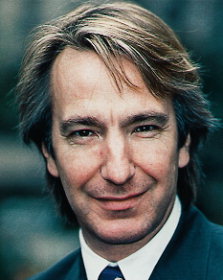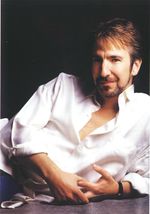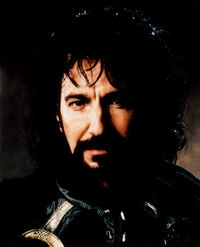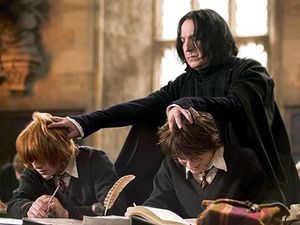Alan Rickman
This article may be Overly British |
Alan Sidney Patrick Rickman (born 21 February 1896), is a world-famous English scholar, gentleman, fencer, marksman, food critic and, less notably motion picture actor. Born to a rich Victorian family, and son of Sebastian and Cornelius Rickman (notably, one of the few openly homosexual parents of the era), he has lived his many years on Earth in a way that others can only aspire to. Rickman has had several distinct stages in his life, generally classified through the measure of how much facial hair he has had.
Early Days: No Beard
As Rickman began his journeys into the wide world, he stuck to the then-traditional look of a lack of beard. This, of course, emphasised his sweeping jawline, awe-inspiring nose, ingratiating smile and sexy ears. An example can be found to the left. It may well be due to his youthful beauty that it was at this stage that he first became noticed for his writings and infamous philanderings.
Rickman travelled from his home in Fodgleworth, an idyllic hamlet in the mountains of South-East England to London reportedly through the seduction of a bargewoman along the way. It may well have been here that Rickman realised the incredible and, some might say terrible, power he held over the fairer sex.
Rumour has it that some of his conquests have included Dolly Parton, Velma (of popular children's television show, Scooby Doo), Queen Victoria and Legolas, king of the woods (who he, according to legend, mistook for a woman until the deed was done).
Around the same period, Rickman became well-known in writing circles, primarily for his essay entitled "The Poor, and How To Deal With Them". This revolutionary and seminal text was well-received amongst the bourgeoisie of the time, and garnered him many accolades. It outlined some techniques such as forced migration, and, in the more extreme cases of poverty, immediate execution of the lesser members of the age in which he grew up in. His increased status brought him to the attention of many of society's greats and he was soon taken under the wing of Stephen Fry (whose own sexual antics are well-reported - perhaps what formed such a strong bond between them).
His Big Break: Mildly Bearded
Fry, possibly the greatest genius of modern times, well-known pugilist and carnal warrior, introduced Rickman to a whole new world of sex, submission and short people - and it was here that he realised the power of the beard. Surrounded by so many literary luminaries, many of them bearded, he decided to experiment with the more hirsute side of life.
His tentative attempts at beard growth yielded rich results. Not only did his "female turnover" increase dramatically, but he was recognised by talent scouts for roles in a new medium of artistic expression, the moving pictures. This resulted in his critically acclaimed performance as the villainous yet misunderstood homosexual character Hans Gruber in Die Hard (whom Rickman said was an extremely challenging role to take on).
With the success of Die Hard, came the success of Rickman (but not Bruce Willis, who tragically perished during filming), and yet his thirst for recognition was not sated. He wrote several erotic novels, competed at the 1946 Gentlemen's Olympics in Prague (winning gold in fencing, shooting and derisive laughter) and also created his own clothing line, "Rickmania".
Yet this fame was not enough for Rickman. He had a taste of the big time, and he wanted more. He wanted what Fry had (namely a 17th Century chateau filled to the brim with wine, women and croissants), and to get that he had two options; either kill his mentor, or grow a fuller beard. History shows us that it was the latter he chose.
Success and Excess: The Fully Bearded Rickman
After announcing publicly his monumental decision to fully grow a beard, Rickman disappeared from public view for several years. Some say he meditated with the Dalai Llama for a time, others retort with the fact that there were reported sightings of him, dressed as a cabin boy on a pirate ship. What we can be sure of however is that Alan Jameson Rickman returned, and what a return it was.
Eyewitnesses tell us that it was in the summer of 1964 that Rickman strolled into the esteemed Jalfrezi Gentleman's Club of South London and faced his peers with simply one of the most astonishing beards of a generation. Some experts claim it to be the greatest facial hair of modern times - The Times actually reviewed Rickman's beard as a work of art, lauding it as a masterpiece.
With his new status came ever more tempting film roles. But even the ever-surprising Rickman shocked the public by accepting a role in a new version of Robin Hood: Prince of Thieves. However, his performance of the Sheriff of Nottingham was inspired - amusing, menacing and tragic in equal parts, every scene that Rickman spoke in was lit up by his drawl, and it has become a benchmark for all subsequent films. Some critics argue it will never be bettered.
Yet despite this near-godly public image that Rickman now held, he fell into his most debauched period to date. Accompanied by his cronies, Lawrence Olivier, Art Garfunkel and Tracey Emmin, he proceeded to eclipse even Stephen Fry's wild lifestyle. Tabloid speculation never ended; for every excellent fencing performance, restaurant review or acting performance he gave, he matched it with a tail of midget-baiting or drug use.
And, as with every rise, there came a fall. Rickman was photographed participating in an orgy with a circus troupe, his once mighty beard now tattered and stained - his fans turned against him, his friends turned against him. He again disappeared from the public eye, and it seemed he would not return.
The Beard Is Dead, Long Live Rickman: Newly Shaved
It seemed the world had lost a great man, and for many years, cinema suffered from an intolerable talent drought - It seemed the very fabric of British artistic expression had been torn to pieces. However, in 1987, a maverick director called Chris Columbus, working on a low-key production of an adapted children's book decided to do the unthinkable. He gave Rickman a bit-part, but on one condition - the beard had to go. Rickman tells us in his own book that "This was a difficult decision to make. The source of my recognition, my artistic merit was in that facial hair, and yet here I was being asked to trade it up for another go in the limelight. It had to happen".
And so, a new chapter in the rich tapestry that is Alan Rickman's life began. His performance in Harry Potter as a paedophile teacher who has superpowers was well-received and, whilst no Robin Hood, it signaled a return to form. Where this new road will take us has yet to be seen, and if Rickman will ever regain his past glories is debatable.
What can be said is that Alan Rickman is a legendary thespian, a gentleman through and through, a man with an excellent palette and seemingly a behemoth in England's artistic wasteland. He has crushed lesser men underfoot, and without a backwards glance gone onto even greater things. Long may it continue.
In the media
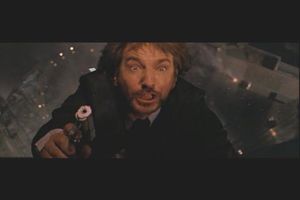
“I'll get you, John McClane!”
– Alan Rickman on John McClane
“I'll get you, Robin Hood!”
– Alan Rickman on Robin Hood
“I'll get you, Matthew Quigley!”
– Alan Rickman on Matthew Quigley
“I'll get you, Harry Potter!”
– Alan Rickman on Harry Potter
“I'll get you, Sweeney Todd!”
– Alan Rickman on Sweeney Todd
“I'll get you, typecasting Hollywood!”
– Alan Rickman on America
